Food containers for resellers and store owners
As a seller looking for food containers, there are several considerations to keep in mind to ensure you’re providing a quality product that meets your customers’ needs:
Material
BPA-free plastic food containers
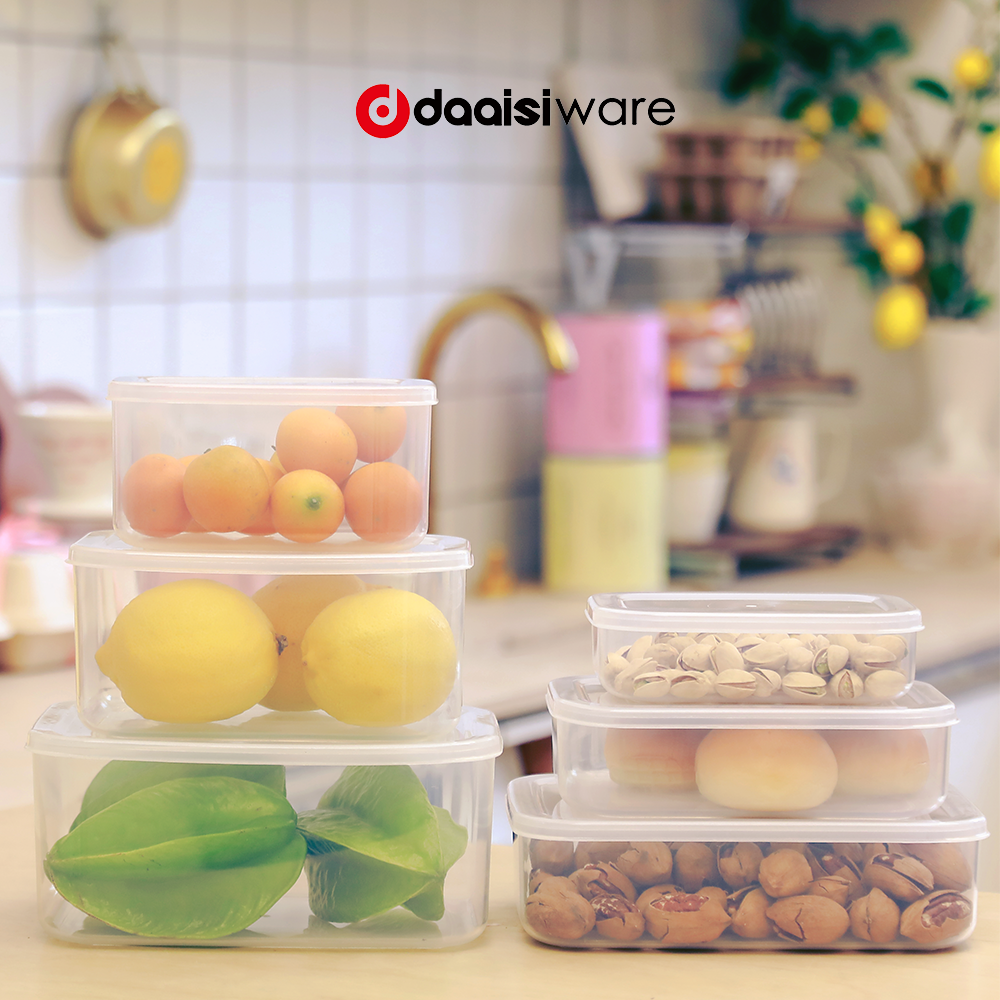
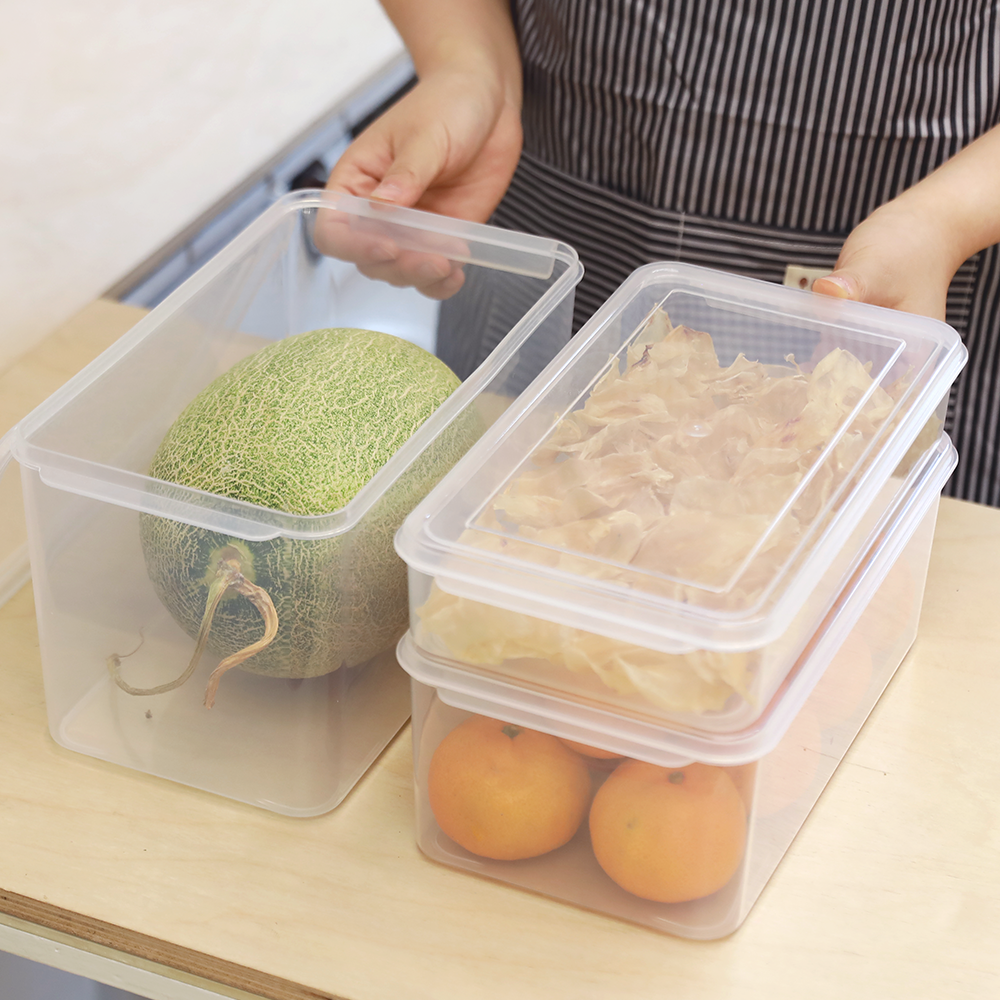
BPA-free plastic food storage containers offer several advantages over traditional plastic containers containing bisphenol A (BPA), which is a chemical often used in the production of polycarbonate plastics and epoxy resins:
- Reduced Health Risks: BPA, a potentially harmful chemical, has been linked to various health concerns such as hormone disruption, reproductive issues, and certain cancers. Consumers can reduce their exposure to BPA by using plastics that are free from this substance.
- Safety for Food Storage: BPA-free plastic containers are considered safer for storing food, especially acidic or fatty foods that may leach BPA from the container material. With BPA-free plastics, there’s less concern about chemicals leaching into the stored food.
- Microwave and Dishwasher Safe: Many plastic containers that are BPA-free can be safely used in the microwave and dishwasher, making them convenient and versatile for heating and cleaning food.
- Lightweight and Durable: BPA-free plastics are suitable for everyday use in the kitchen and for transporting food due to their lightweight and durable nature.
- Affordability: BPA-free plastic containers are more affordable than alternatives like glass or stainless steel, making them accessible to a wider range of consumers..
- Variety of Shapes and Sizes: BPA-free plastic containers are available in a variety of shapes and sizes to meet different storage needs.
- Transparency: Transparent BPA-free plastic containers reduce food waste by allowing users to see the contents inside without opening.
- Resistance to Odors and Stains: BPA-free plastics resist absorbing odors and stains, keeping stored food fresh.
Overall, BPA-free plastic food storage containers provide a safe, convenient, and affordable option for storing and transporting food while minimizing potential health risks associated with BPA exposure.
Glass food containers
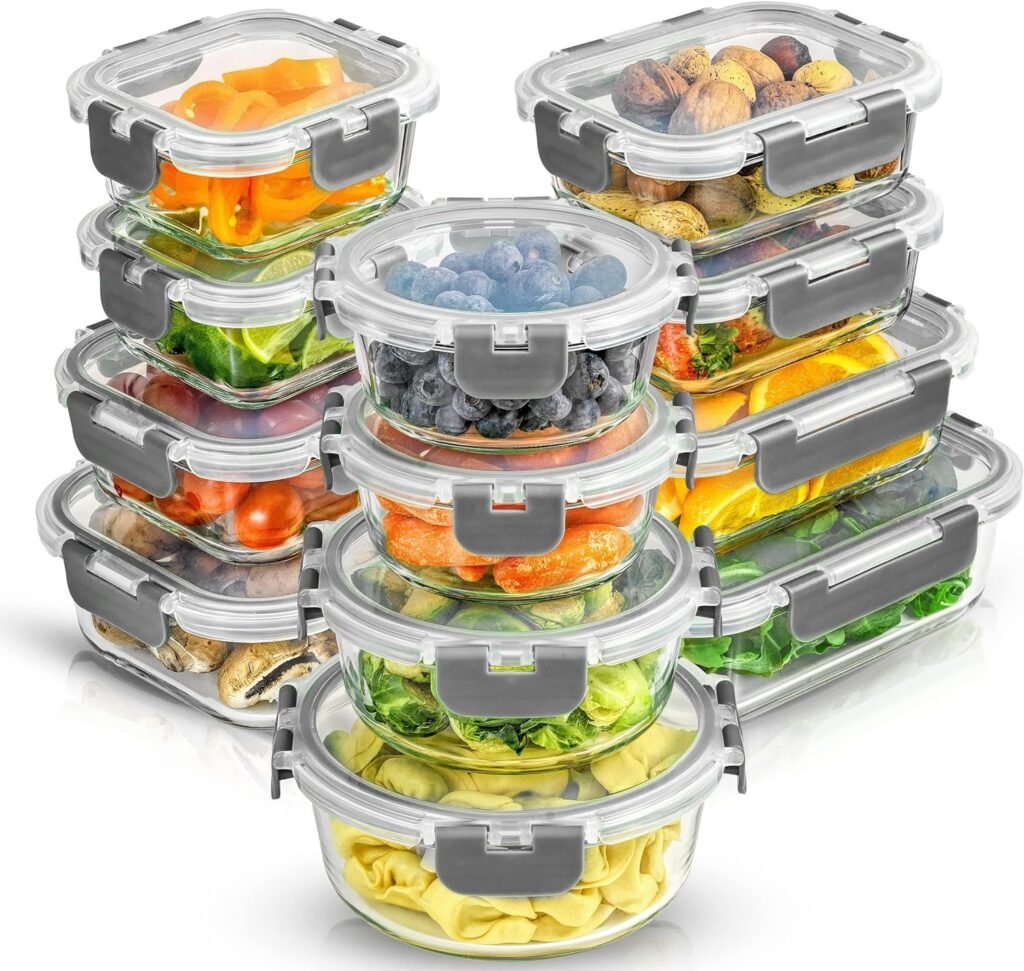
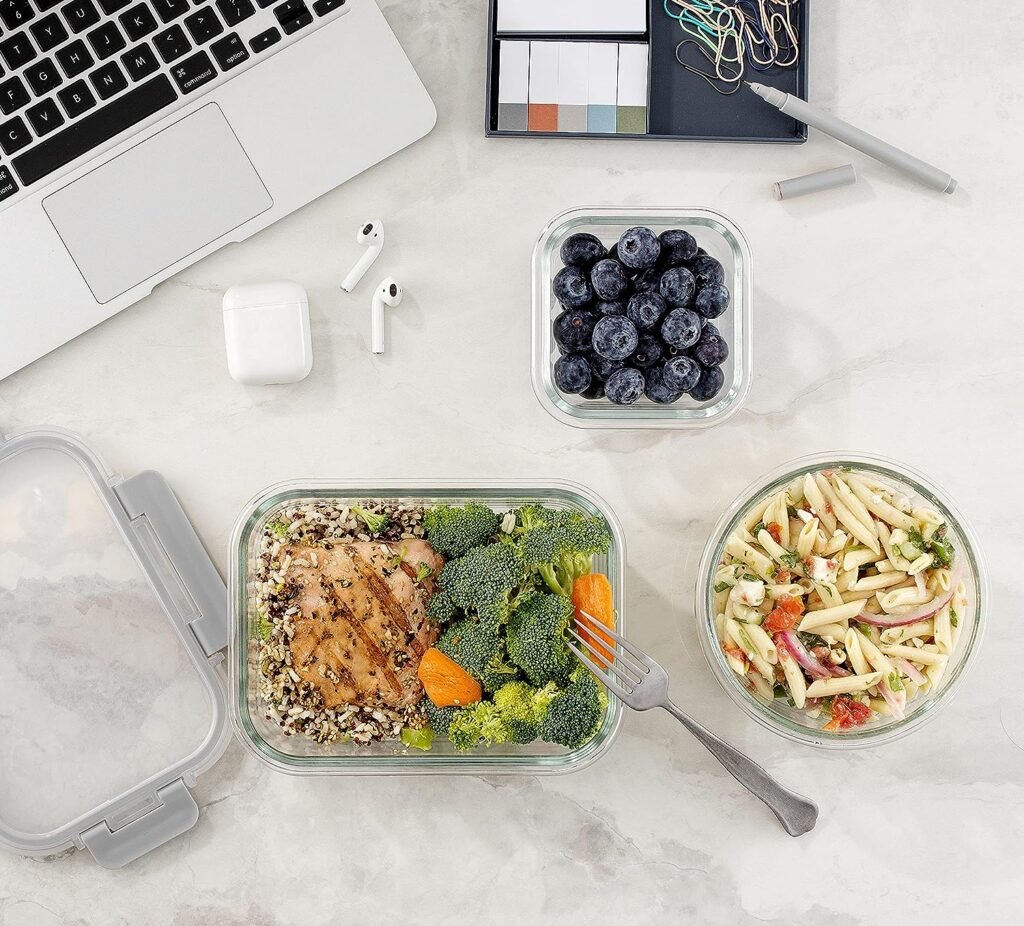
You may also want to consider the glass food storage container.
- Safety: Glass containers are a safe and chemical-free way to store food. Unlike some plastics, they don’t contain harmful substances like BPA and phthalates. High-quality glass containers are an excellent choice for storage because they’re durable and resistant to scratching, staining, and cracking. They’re also more reliable and long-lasting than plastic containers. However, glass containers can be more fragile than plastic or stainless steel ones, and can easily break if dropped or mishandled. Therefore, it’s essential to handle them with care, especially in households with children or busy kitchens where accidents are more likely to happen.
- Non-Porous: Glass is non-porous, which prevents the absorption of odors, flavors, or stains from food, keeping containers clean and odor-free.
- Versatility: Glass containers are highly versatile, being safe to use in the microwave, oven, refrigerator, freezer, and dishwasher without any concerns about warping or damage. This makes them ideal for cooking and storage purposes.
- Durability: High-quality glass containers are an excellent choice for storage as they are durable and resistant to scratching, staining, and cracking. They are a more reliable and long-lasting option compared to plastic containers. However, glass containers can be more fragile than plastic or stainless steel containers, and can easily break if dropped or mishandled. Therefore, it is essential to handle them with care, particularly in households with children or busy kitchens where accidents are more likely to occur.
- Transparency: Glass containers are see-through, which makes it easy to keep track of what’s inside and can help you plan meals, stay organized, and reduce food waste.
- Heat Retention: Glass is an excellent heat insulator, making it ideal for keeping food warm for long periods. It is particularly useful for serving dishes or preparing meals.
- Weight: Glass containers are heavier than plastic containers, which increases shipping costs.
- Limited Designs: Glass containers often come in fewer design options compared to plastic containers, which may limit choices in terms of sizes, shapes, and lid styles.
- Temperature Shock: Glass containers can shatter if exposed to sudden temperature changes, such as transferring from the freezer to a hot oven, which may also cause safety problems.
- Cost: Compared to BPA-free plastic food storage containers, glass containers cost more.
Overall, glass food storage containers are a popular choice for many consumers due to their safety, durability, and versatility, despite some drawbacks such as fragility and higher cost.
Stainless steel food containers
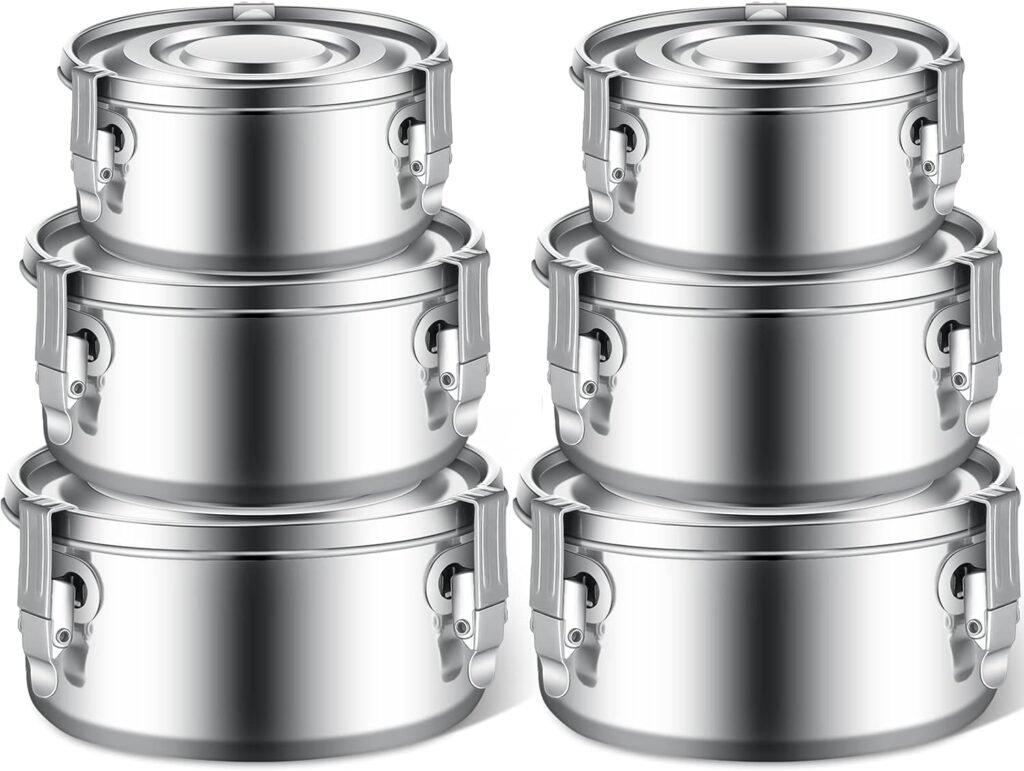
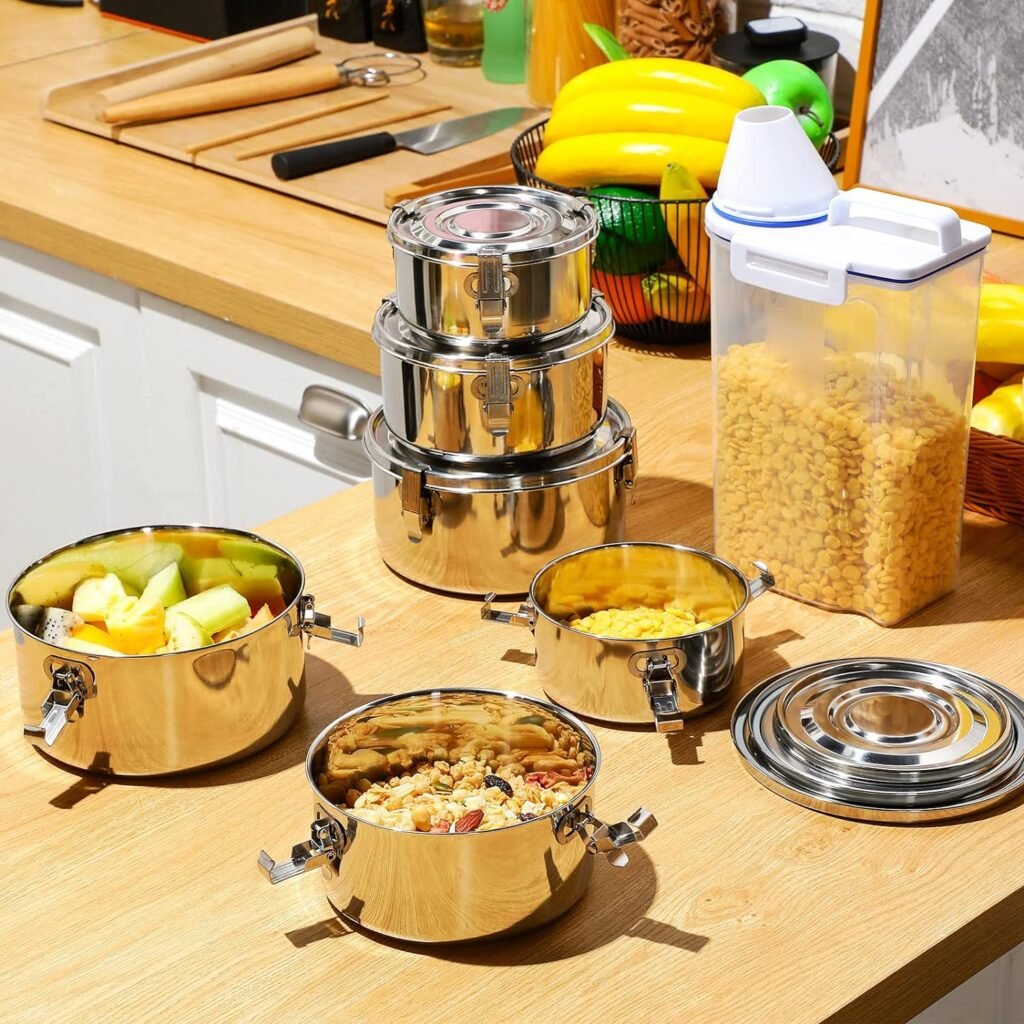
Advantages:
- Unyielding Strength: Stainless steel containers stand as stalwart guardians of your culinary creations, impervious to dents, scratches, and the ravages of time. They defy breakage, offering a fortress-like defense against wear and tear.
- Guardians of Safety: With stainless steel, safety reigns supreme. Free from the shackles of toxic chemicals like BPA and phthalates, these containers provide a sanctuary for your food, ensuring purity with every seal.
- Masters of Versatility: Stainless steel containers are the Swiss Army knives of the kitchen, seamlessly transitioning from fridge to oven, stovetop to dishwasher. Their adaptability knows no bounds, ready to meet any culinary challenge.
- Temperature Titans: Harnessing the power of thermal conductivity, stainless steel containers are the keepers of warmth, ensuring your dishes stay toasty for hours. Yet, they also wield the chilling prowess to keep cold foods frosty and refreshing.
- Sovereigns of Freshness: With lids that lock like vaults, stainless steel containers stand as sentinels against leaks and spills. They preserve your culinary treasures with an airtight embrace, safeguarding freshness with unwavering resolve.
- Eco-Warriors: Stainless steel containers march boldly into battle against plastic waste, offering a sustainable solution that champions the planet. Their resilience ensures a legacy of reuse, minimizing environmental harm.
- Defenders Against Odors and Stains: Non-porous and indomitable, stainless steel repels odors and stains like a fortress against invaders. They maintain a pristine facade, banishing lingering smells and unsightly marks from your kitchen domain.
Disadvantages:
- Initial Investment: Embark on a journey of culinary excellence with stainless steel, but be prepared for the upfront cost. Though their might commands a premium, their enduring loyalty promises a return on investment.
- Weighty Warriors: As stalwart protectors, stainless steel containers carry the weight of their duty with pride. Yet, their heft may test the mettle of those tasked with transport, a reminder of their unyielding strength.
- Veiled Guardians: Unlike their transparent counterparts, stainless steel containers shroud their contents in mystery. While their enigmatic allure may spark curiosity, revealing their treasures requires a leap of faith.
- Heat Warriors: In the crucible of culinary creation, stainless steel stands firm against the flames. Yet, their valor may yield scalding consequences if not handled with care, a reminder of their fiery resilience.
Stainless steel food storage containers reign supreme as stalwart protectors of culinary excellence, offering durability, safety, and versatility to kitchen adventurers. Though they may come with challenges, their unwavering loyalty and eco-friendly stance make them indispensable companions on any culinary quest.
Choose your products
As a store owner or container reseller, how do you choose your products? Here are a few tips:
- Material: When storing food, it is important to choose the right materials to ensure safety. BPA-free plastic, glass, and stainless steel are all great options. Plastic is lightweight and durable, making it easy to transport and store, but it is important to choose BPA-free plastic to avoid any harmful chemicals. Glass is another option, which is both microwave and dishwasher-safe, and also doesn’t absorb any odors or flavors. Lastly, stainless steel is a great choice as it is long-lasting, non-reactive and doesn’t contain any harmful chemicals. By choosing the right material, you can ensure your food stays safe and fresh for longer.
- Size and Shape: Offer containers in various sizes and shapes to suit different storage needs. Consider providing sets of different sized containers to cater to different preferences.
- Leak-proof and Airtight: Customers often seek leak-proof, airtight containers to keep food fresh and avoid spills. Ensure that the containers come with tight-sealing lids featuring silicone gaskets or other sealing mechanisms.
- Microwave and Freezer Safe: Ensure that the containers are safe for use in the microwave and freezer, as many customers use them for storing leftovers and meal prepping.
- Reusable and Durable: Emphasize the reusability and durability of your containers to appeal to environmentally-conscious consumers looking to reduce waste.
- Transparent and Stackable: Clear containers allow customers to easily see the contents without opening them, while stackable designs help save space in the refrigerator or pantry.
- Branding and Packaging: Consider customizing the containers with your brand logo and packaging to differentiate your products and build brand recognition.
- Compliance and Safety: Make sure your containers comply with relevant safety regulations and standards for food storage products.
- Customer Reviews and Feedback: Pay attention to customer reviews and feedback to identify any issues or areas for improvement with your containers and address them promptly.
- Cost and Pricing: Balance the quality and features of your containers with competitive pricing to attract customers while ensuring profitability for your business.
When sourcing food containers for your Amazon store, consider working directly with manufacturers or wholesalers to ensure quality control and competitive pricing. Additionally, you may want to explore private labeling options to create a unique brand identity for your products.
Follow: